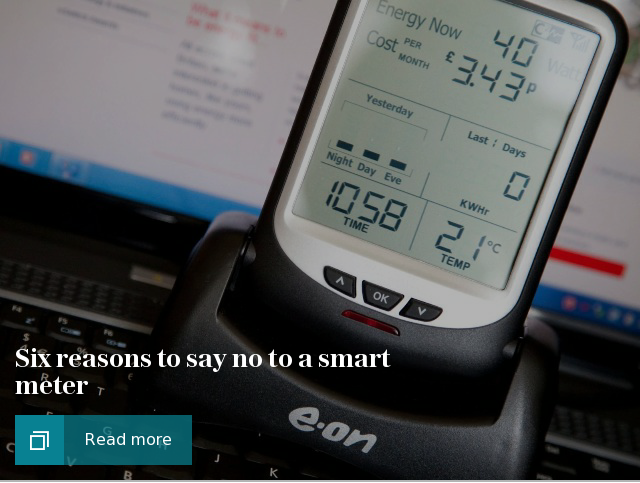'First generation' smart meters which hinder switching could be installed for another year

Energy suppliers could be allowed to continue installing the first generation of smart meters for more than a year despite questions over their compatibility, the Government has hinted.
Almost eight million smart meters, which come with an interactive display allowing customers to track their energy use, have been installed in British homes. But problems with the first batch of meters - known as "SMETS I" - mean that some lose their smart functionality when consumers switch energy supplier.
Some energy companies have already begun installing an upgraded version, SMETS II, which the Government insists will fix the issue - but the Telegraph can now reveal that thousands of homes could still be given an old meter, even after the new ones are available.
Consultation papers, published on Monday by the Department for Business, Energy and Industrial Strategy (BEIS), suggest that the original July 2018 deadline for switching to SMETS II installations could be extended by six months.
This could mean hundreds of thousands of additional first-generation meters being installed in homes. Some energy insiders have claimed these will later need to be physically replaced, but the Government has repeatedly insisted this will not be necessary.
British Gas confirmed it is already installing SMETS II meters in a small number of homes and will widen the programme early next year. Fellow "big six" supplier SSE is not currently installing SMETS II meters, but plans to in the coming months.
The consultation papers say SMETS II meters will retain their functionality when consumers change suppliers, and that they deliver other additional benefits, including "data access for third parties". A BEIS spokesman said this could include "energy services companies and comparison sites", but customer consent would be required.
The £11bn smart meter rollout, in which every household will be offered one by 2020, has come in for criticism with academic studies suggesting it will only cause a reduction in energy use of only 3pc.
The push has also come up against a general lack of interest from the public.

Users have questioned whether having a real-time display will really cause someone to change the way they use energy. Others have raised concerns over the security of the data and the potential risk of fire, although Smart Energy GB, the body tasked with promoting the rollout, insists neither of these are a major issue.
The relaxed deadline is necessary, the consultation argues, to allow for potential delays in the testing of SMETS II meters and the fact energy suppliers may need to order the first-generation meters as much as nine months before the cut off date.
A spokesman for BEIS said suppliers would have to provide a legitimate reason for installing SMETS I meters after the deadline, and subsequent installations would be capped at 70pc of the number installed in the third quarter of this year.
He added: "The Government is ensuring the move to second generation smart meters happens as quickly and smoothly as possible.
"There has been no change to the July 2018 deadline for first generation meter installations. We’re consulting on proposals that will allow suppliers who can meet strict criteria, to avoid costs that might otherwise be passed on to consumers.
"We remain committed to a smart meter being offered to every home and small business by the end of 2020, allowing customers to take greater control of their energy consumption and putting an end to estimated bills."
The consultation closes on Nov 10.

 Yahoo Finance
Yahoo Finance 